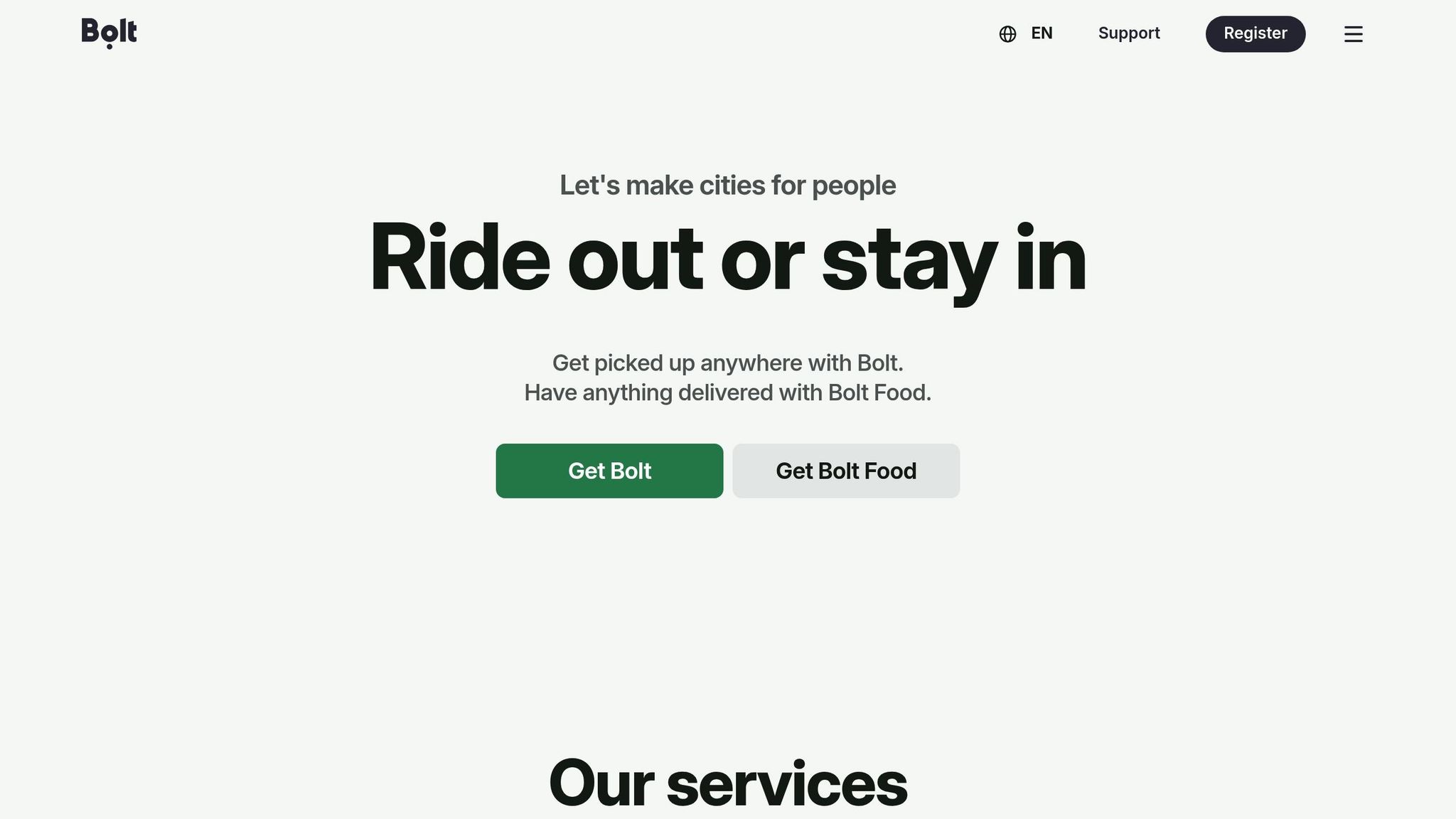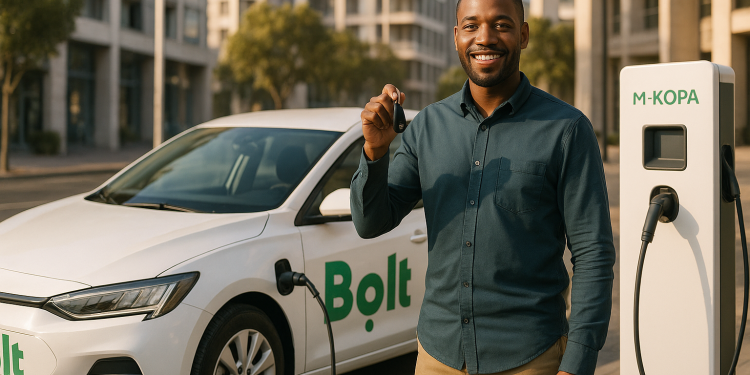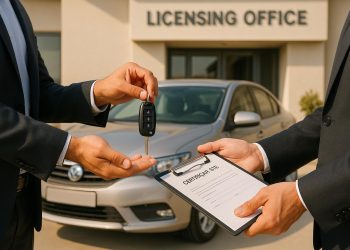Bolt and M-KOPA are teaming up to make electric ride-hailing more accessible in South Africa. Their partnership combines Bolt’s ride-hailing network with M-KOPA’s flexible "pay-as-you-go" financing model, targeting drivers who can’t access traditional loans. This initiative focuses on affordable electric motorcycles for delivery services and compact electric cars for urban rides, aiming to reduce costs for drivers and improve air quality in cities.
Key points:
- Flexible Financing: Drivers can lease-to-own vehicles with low upfront costs.
- Electric Motorcycles: Ideal for delivery services, with lower running costs and swappable batteries.
- Compact Electric Cars: Designed for urban ride-hailing, offering reduced fuel expenses and modern features.
- Charging Solutions: Plans to expand infrastructure and integrate home and public charging options.
The program draws lessons from M-KOPA’s successful pilot in Kenya, emphasizing gradual rollouts, driver education, and community support. Challenges like limited charging infrastructure remain, but the initiative holds promise for cleaner, cost-effective transportation in South African cities.
How Bolt and M-KOPA Plan to Change Electric Ride-Hailing

Bolt and M-KOPA have teamed up to tackle a big challenge faced by gig economy drivers: access to electric vehicles. By combining technology with a flexible financing model, they’re aiming to make electric ride-hailing more accessible and sustainable.
Main Features of the Program
M-KOPA’s pay-as-you-go financing model is a game-changer. Instead of requiring large upfront payments or traditional bank loans, drivers can get behind the wheel of an electric vehicle with manageable payments that align with their often unpredictable incomes. This means starting with minimal upfront costs.
There’s also a lease-to-own option, which allows drivers to gradually work toward owning their vehicles through regular payments. This approach doesn’t just make vehicles affordable – it helps drivers build long-term assets. Plus, the program includes ongoing maintenance and technical support to keep things running smoothly.
Bolt’s contribution goes beyond just being a ride-hailing platform. They’re actively integrating electric vehicle drivers into their network and offering perks like preferential dispatch and special incentives for sustainable mobility. Together, Bolt and M-KOPA are blending financing and technology to prioritize eco-friendly transportation.
Lessons from Kenya‘s Pilot Program
M-KOPA’s experience in Kenya offers valuable insights for their South African rollout. In Kenya, they tested electric motorcycles for delivery services, proving that electric mobility works well in similar economic environments. The pilot showed that electric vehicles can significantly cut fuel and maintenance costs while highlighting the need for strong charging infrastructure and driver training.
The Kenyan pilot also emphasized the importance of educating drivers about energy management, charging practices, and route planning. This kind of knowledge is critical for making the switch to electric vehicles successful.
Another important takeaway was the role of community support networks. Drivers who could share experiences and advice with peers adapted more easily to electric vehicles. This insight is shaping the South African program, with plans to establish driver communities and support groups.
Lastly, the pilot demonstrated the value of starting small. Rolling out electric vehicles gradually – beginning with a limited number of drivers and scaling up based on success – proved more effective than launching on a large scale. This step-by-step approach allows for identifying and solving challenges early, and it’s a strategy M-KOPA intends to replicate in South Africa.
Electric Vehicles Being Considered for South Africa
Bolt and M-KOPA are exploring electric vehicles that align with urban transit demands while ensuring reliable income opportunities for drivers. Their goal is to make electric mobility more accessible and practical for South Africa, emphasizing affordability, low maintenance, charging compatibility, and suitability for local road conditions. Instead of focusing on premium electric vehicles that may be out of reach for many, they’re prioritizing vehicles that cater to both delivery and ride-hailing services.
Electric Motorcycles for Delivery Services
Electric motorcycles present an immediate and practical option for South Africa’s gig economy, particularly in delivery services. These vehicles have already proven effective in reducing fuel and maintenance costs in similar markets, making them a logical choice for local delivery drivers.
Designed for last-mile deliveries and food delivery platforms, these motorcycles typically offer a range of 37-50 miles per charge – enough to handle most urban delivery routes without the need for mid-day recharging. Their lightweight build makes them perfect for maneuvering through traffic and reaching areas where larger vehicles might struggle.
One of the biggest advantages is the low operating cost. With no fuel expenses and minimal maintenance due to fewer moving parts, electric motorcycles allow drivers to keep more of their earnings – an important factor for those operating on tight margins.
Many of the models under consideration include removable batteries, which solve a common challenge in EV adoption: charging downtime. Drivers can charge extra batteries at home and swap them out as needed, ensuring uninterrupted work during peak hours.
Small Electric Cars for City Ride-Hailing
For ride-hailing services, Bolt and M-KOPA are evaluating compact electric cars that balance affordability, passenger comfort, and driver profitability. These vehicles are designed to meet the needs of urban passengers while keeping costs manageable for drivers.
The cars being reviewed typically seat four passengers and offer a range of 93-124 miles per charge, which is sufficient for most daily routes in South African cities. Features like air conditioning, smartphone connectivity, and modern safety systems ensure that passenger expectations are met.
From a driver’s perspective, energy efficiency is a key benefit. These vehicles operate at a fraction of the cost of traditional gasoline cars, with electricity expenses being 60–70% lower than fuel costs – a crucial advantage as fuel prices continue to rise.
To enhance usability, the cars come equipped with digital dashboards that provide real-time updates on battery levels, charging station locations, and energy usage. These features help drivers optimize their routes and charging schedules, maximizing their earnings.
Charging infrastructure compatibility is also a major consideration. The vehicles under review can charge using both home outlets and public fast-charging stations. Fast-charging options allow drivers to quickly add range during breaks, minimizing downtime during busy periods.
Some models even include swappable battery technology, which could transform the ride-hailing experience. Instead of waiting for 30-45 minutes to charge, drivers could exchange a depleted battery for a fully charged one within minutes, similar to refueling a gas-powered car. This innovation aligns with the partnership’s mission to lower costs and reduce environmental impact while keeping drivers on the road longer.
Charging and Daily Operations
For electric ride-hailing to thrive in South Africa, a dependable and efficient charging system must seamlessly fit into drivers’ daily routines. Companies like Bolt and M-KOPA are prioritizing solutions that keep vehicles powered without interrupting work schedules. While specific details are still being finalized, the program aims to offer flexible and convenient options tailored to the varying needs of drivers. This emphasis on ease and practicality is shaping the search for charging systems that work for everyone.
Charging Infrastructure and Options
For drivers with reliable access to electricity, home charging could be a practical solution. However, for those without this option, alternative charging networks are under consideration to ensure minimal downtime. Future systems are expected to incorporate app-based features for payment and monitoring, making the charging process smoother and more efficient.
Energy Efficiency and Cost Savings
Electric vehicles bring more than just convenience – they also offer notable energy and cost benefits. With fewer moving parts and features like regenerative braking, maintenance needs are reduced, and energy usage is optimized. Regenerative braking, for instance, recaptures energy during deceleration, adding to the vehicle’s efficiency. Plans are also in motion to implement smart charging strategies, such as using off-peak electricity rates, to keep energy costs low. While exact figures aren’t available yet, the shift to electric ride-hailing is set to deliver both financial and environmental advantages.
sbb-itb-09752ea
Impact on Passengers
Electric ride-hailing offers a noticeably better experience for passengers. The quiet operation means rides are more peaceful, free from the usual engine noise. Plus, with zero tailpipe emissions, the air inside and around the vehicle feels fresher, making the cabin more pleasant overall. The smooth acceleration and deceleration, thanks to instant torque, add to the comfort, creating a ride that feels steady and seamless.
On top of that, the lack of direct emissions ties into the growing demand for environmentally conscious travel. It’s a step forward for those who value cleaner, greener transportation options, fitting perfectly with the shift toward more sustainable and affordable mobility solutions.
Challenges and Opportunities
Infrastructure Challenges
South Africa’s limited charging infrastructure presents a significant roadblock to the growth of electric ride-hailing. With only a small number of charging stations available, drivers often worry about running out of power during trips, which adds to the difficulty of adopting electric vehicles. Expanding and improving this infrastructure is crucial to easing these concerns and paving the way for broader adoption. Investing in more charging solutions could not only reduce range anxiety but also boost the efficiency and appeal of electric ride-hailing services.
Conclusion and Future Outlook
Key Takeaways
Bolt and M-KOPA are working together to reshape South Africa’s transportation landscape with electric vehicle (EV) solutions that are both accessible and energy-efficient. This partnership tackles two major hurdles: offering affordable electric vehicles through flexible financing options and reducing drivers’ operational costs with efficient, sustainable transportation choices.
The initiative focuses on electric motorcycles for delivery services and compact electric cars for urban ride-hailing, paving the way for broader EV adoption. By combining M-KOPA’s expertise in asset financing with Bolt’s established ride-hailing network, this collaboration enables drivers to switch to cleaner technology without needing significant upfront investments.
The benefits go beyond just the drivers. Passengers may enjoy lower ride fares thanks to reduced fuel costs, while the environmental advantages – like improved air quality and reduced emissions – align with South Africa’s climate goals. This creates a ripple effect, positively impacting the automotive industry and urban environments.
What to Watch Next
The program’s success will hinge on its rollout and real-world impact. Key developments to monitor include the selection of pilot cities, with urban hubs like Cape Town, Johannesburg, and Durban likely being top choices due to their high demand for ride-hailing services.
Government policies and incentives will also play a crucial role. Support for EV adoption, including investments in charging infrastructure, could significantly influence the pace and scale of the initiative’s expansion.
Driver participation during the initial pilot phase will be a critical indicator. Adoption rates will help assess whether the financing model effectively addresses affordability concerns. These early results will guide adjustments to the program and inform strategies for scaling across various vehicle types and services.
Additionally, keep an eye on technology adaptations tailored to South Africa’s unique conditions. This includes modifications to vehicles for local roads, charging solutions compatible with the national power grid, and mobile payment systems that cater to local banking habits. These innovations will be essential for ensuring the program’s long-term success.
FAQs
What is the pay-as-you-go financing model for drivers switching to electric vehicles in South Africa, and how does it work?
The pay-as-you-go financing model offers an easier path for drivers to shift to electric vehicles (EVs) by spreading the cost into smaller, more manageable payments. Rather than facing a hefty upfront expense, drivers can opt to lease or rent EVs and pay in installments over time.
This setup aims to make EV ownership within reach for individuals who might not have the financial means for a large initial payment. It also broadens access, enabling more people to take advantage of the lower running costs and eco-friendly benefits that come with driving electric vehicles.
What challenges do Bolt and M-KOPA face in bringing electric ride-hailing to South Africa, and how are they addressing them?
Bolt and M-KOPA are navigating several hurdles as they work to bring electric ride-hailing services to South Africa. Among the main challenges are regulatory hurdles, the steep upfront costs of electric vehicles (EVs), and the scarcity of charging infrastructure. These obstacles make it tough for drivers to switch to EVs and for the service to grow at scale.
To tackle these challenges, they’re turning to M-KOPA’s fintech platform, which enables drivers to make flexible micropayments. This setup helps ease the financial strain of buying EVs, making them a more realistic option for many drivers. On top of that, Bolt and M-KOPA are building on their experience in Kenya, where they successfully introduced over 5,000 electric bikes. This Kenyan model is being used to lower operational costs and boost driver earnings in South Africa. Together, their efforts are aimed at creating a ride-hailing system that’s both more sustainable and supportive of global environmental initiatives.
How will electric motorcycles and compact electric cars change the cost and efficiency of ride-hailing and delivery services in South Africa?
Electric motorcycles and small electric cars are poised to transform ride-hailing and delivery services in South Africa. By cutting down on fuel and maintenance costs, these vehicles offer a more economical way to operate. Plus, their ability to charge faster means less downtime, keeping services running smoothly.
Their compact size is another big advantage, especially in crowded city streets. They can zip through traffic more easily, reducing travel times and speeding up deliveries. On top of that, these vehicles align with environmental goals, attracting riders who care about sustainability while helping to cut down on urban pollution. This shift promises to make transportation services not only more affordable and efficient but also cleaner and better for city living.
Related posts
- SA’s First Solar EV Charging Stations: What to Know
- Are South Africans Ready for the EV Revolution?
- Spiro and BasiGo models spark local EV fleet interest
- Kenya’s EV charging rollout inspires South African planners





